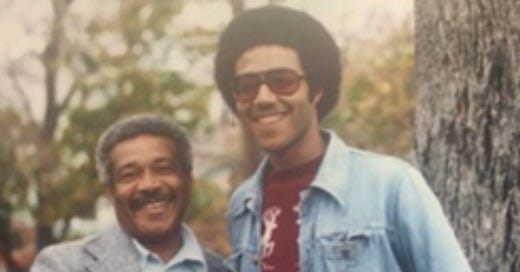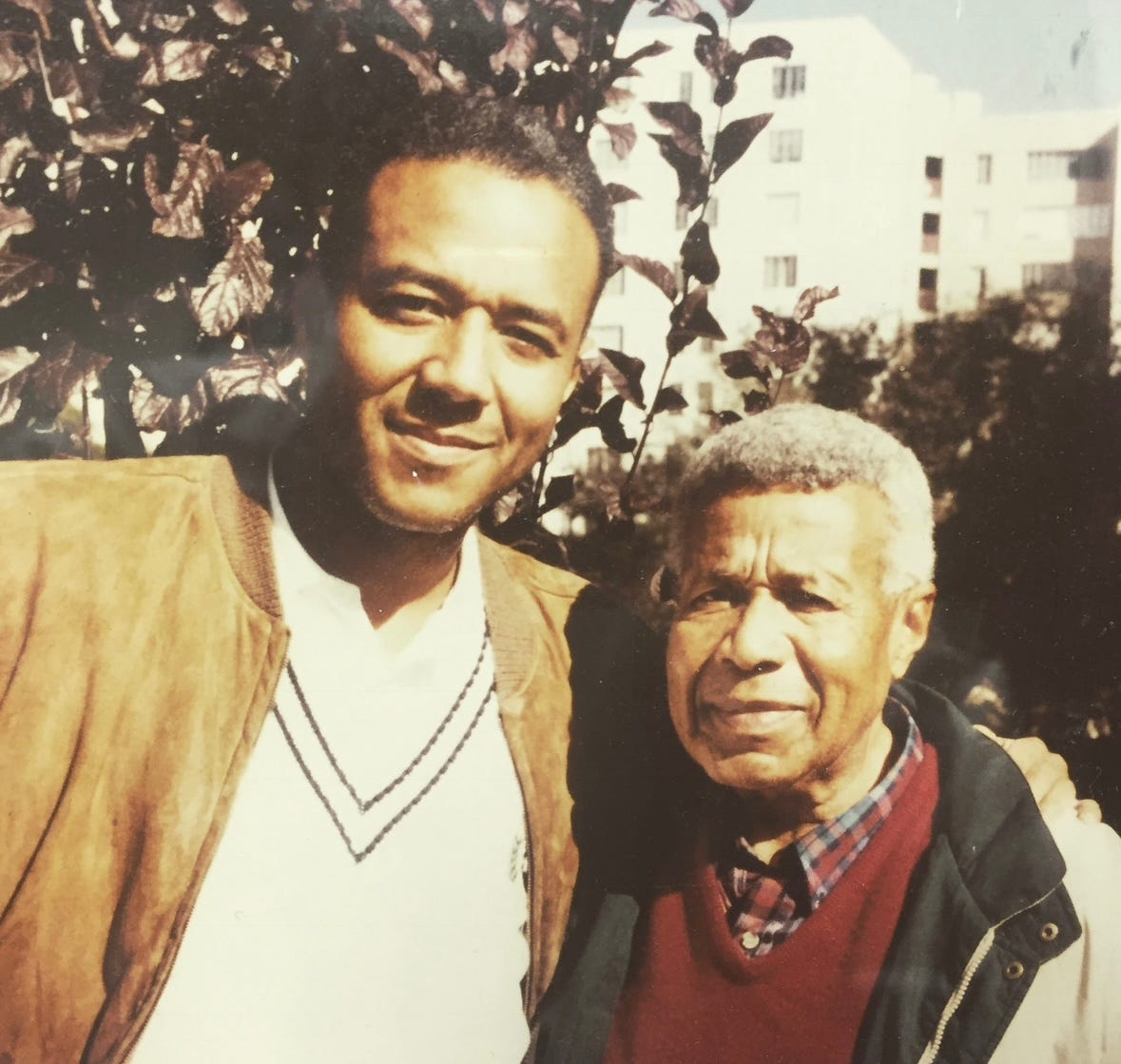Truths My Father Told Me
Some of the most important lessons my dad taught my brother and me were through a series of puzzling maxims that I only recognized as wisdom years later
I used to have a photo of my father that is now unfortunately long gone. Still I own the image in my memory. In the photo, my dad stands on an expanse of grass. In the background, there's a thick stand of trees and a chain-link fence. He's in a park and, though you can't tell, he's standing in the outfield of a baseball field. My brother and I are there, off-camera somewhere. In the image as I recall it, my father is slightly angled away from the camera, looking impassively in the direction of the lens. He’s wearing street clothing, a shirt and slacks, no jacket or tie. His middle aged paunch is on display. One arm hangs down loosely. His left arm is cocked at an angle and his hand rests on his hip. On that hand, he wears a baseball glove. His street clothes and the glove are almost comically incongruous.
I'm guessing now. I’m imagining we’re there so we — my dad, my older brother Keith and I; my mom no doubt took the photo - can play catch, as we used to call it; toss a baseball around. I was probably 9 or 10 at the time. Keith was a year older than me. My dad taught us how to play baseball, how to throw, catch, hit, run. He taught me to love baseball. But the most important lessons my father taught us were not about baseball. He taught us about life and about people. But it would take me years before I realized just how valuable that was. By then, he was no longer alive.
The thing about my dad's life lessons was that they were rarely explicit or direct like the fathers that I would see on TV shows. Instead, he often communicated these ideas through aphorisms, sometimes humorous, sometimes not. Some of them I must have heard dozens of times, and many of them I found puzzling, even indecipherable, but always intriguing. Unconsciously, unwittingly, I committed them to memory and, over the ensuing years and decades, they would pop into my head and I would turn them over in my mind anew. What did he mean by that? In time as I made my way through life, the meanings of what he'd said - the real meanings - would reveal themselves. My dad's nuggets of wisdom would one day provide valuable guidance and insight. Which made me sometimes wonder if that had been his intention all along, that he meant to plant these seeds when we were young in the expectation that one day what he was saying would make sense and be helpful as we made our way through life. I’ll never know. My dad died before I could ask him.
Over the past few years, as they come to mind, I've recorded my father's sayings. I've got quite a dossier of them now. Re-reading them, I sometimes find myself smiling, sometimes laughing. Sometimes, they make me sad. Not because they are sad but because they remind me how much I miss my father.
What follows is an annotated compilation of 10 of my dad's "Greatest Hits."
1. "It's better to have and not need than need and not have."
This piece of advice has come in handy many, many, many times in my life whether it's grabbing a coat just in case it is turns to be colder than you, or bringing a portable cell phone charger when you go out for the day, or filling up the gas tank before heading out in your car, etc. This sagacious guideline has endless applications. It's rarely a bad idea to be overprepared.
2. "The man who had no shoes felt sorry for himself until he met the man who had no feet."
Even as a kid, I got this one. Or, at least, I understood its meaning. It still took me some time to fully appreciate its warning against self-pity and putting one's personal woes in perspective.
3. "Don't make your future your past."
To a child, or at least to me as a child, this was one was baffling. Eventually, I would decide that my father meant it as a warning not to make your early years the best years of your life, like the high school football star who spends the rest of his life reminiscing about that halcyon time. In his song, Glory Days, Bruce Springsteen sings it.
I hope when I get old I don't sit around thinking about it
But I probably will
Yeah, just sitting back trying to recapture
A little of the glory, yeah
Well, time slips away and leaves you with nothing, mister, but
Boring stories of
Glory days
4. "Don't create trouble."
Bingo! Sometimes things will go badly. That's life. It's as inevitable as the sunrise. What you don't want to do is stupid things that cause you trouble. Mistakes happen. Just try to avoid unforced errors.
5. "Wrong is wrong."
On the face of it this tautology is as absurd as when Donald Trump remarked in response to a question at an economic forum last summer that "child care is child care." (You can look it up). But this one actually conceals what I eventually recognized as a profound moral truth. It is easier to understand spoken, with the emphasis on the second "wrong." It is saying, in effect, there is no excuse, no defense, no alibi for something that is, well, wrong.
6. "Don't positively reward negative behavior."
This appealed to me as someone who once studied B.F. Skinner's behavioral theory of conditioning, that is, that an animal or person learns to associate a particular stimulus with a particular response, e.g., a rat that hits a bar that releases a pellet of rat food will learn to press the bar to be fed. In that scenario, the action of hitting the bar is positively reinforced by the reward of food. By the same token, if a negative behavior is rewarded, it too would be reinforced and the rat (or person) encouraged to do it again. It’s akin to the concept of moral hazard in economics, which the Oxford Dictionary defines as "lack of incentive to guard against risk where one is protected from its consequences." If you don't suffer the consequences of a bad decision, that undermines the incentive not to repeat it.
7. "Bad news travels fast."
Here's a hypothetical scenario: A friend's son or daughter gets arrested for drunken driving and is sentenced to jail and rehab. Now here’s another: that same friend's son or daughter gets an exciting new job in a new city. News of which development is more likely to spread quickly? I’d say, most times, it’s the former. There are exceptions, sure, but you get the point. Conversations that begin with "Did you hear about?" are very often a prelude to a tale of someone else's astonishing misfortune. It may not be the case that the person passing along the bad news is enjoying or reveling in it, though that does occur. It's that there's a human fascination with and urgency to recount the news that something that has gone awry in someone else's life. When I catch myself about to do this - and no doubt I don’t always catch myself - I try to stop, recognize the impulse and desist.
8. "(Some) people take kindness for weakness."
I don't remember whether my father qualified this with "some." Regardless, some/many/most? people see an act of forgiveness, or kindness not as decency but evidence that you're naive, stupid and/or exploitable. The take-away is not to be rude or ungenerous in order to protect oneself. Even if that suspicion might inoculate you from being taken advantage of or underestimated, it would not be a healthy or pleasant way to live, always on guard. The moral, as I took it, is to be aware that's how some people are, and if it happens, well, it's probably a good idea to correct that offender's misapprehension so it doesn't happen again.
9. "It's better to wear out than rust out."
This maxim really speaks to me. Staying active as long as you is far preferable to being inactive or lazy. Doing is, to my mind, better than not doing. When I was a young newspaper reporter, an older guy who worked in the art department and sat near me once put it this way: “You know what I say, kid? I say, do it now!”
10."You have to live before you die."
This is kind of an elaboration on the message of No. 9. The years pass quickly. Use your time in ways that bring your pleasure or gratification or fulfillment.
An Australian palliative nurse who cared for people who were dying once compiled what she said were the five greatest regrets of people at the end of their lives. They were:
I wish I had the courage to live a life true to myself, not the life others expected of me.
I wish I hadn’t worked so hard.
I wish I had the courage to express my feelings.
I wish I had stayed in touch with my friends.
I wish I had let myself be happier.
A few years ago, I wrote about ikigai, the Japanese word and concept that roughly translates to your reason for being.
“Try to connect deeply with the people you care about,” said Akihiro Hasegawa, a Japanese clinical psychiatrist who has studied ikigai. “Take time to find the things in life that give your meaning, purpose and joy in your day-to-day living.”
The Big Wheel keeps on turning. Find the time for what and who make you happy. I’m pretty certain that was what my father meant. Thank you, Dad.







Love it! Best for the new year!
Thanks for sharing these, Ron. I enjoyed reading the maxims and your interpretations. You would have enjoyed my dad - I don’t think you ever met him. He was a psychology professor at CSUN and a Skinnerian. He would have appreciated your explanation, as he used to use rats and mice in experiements.